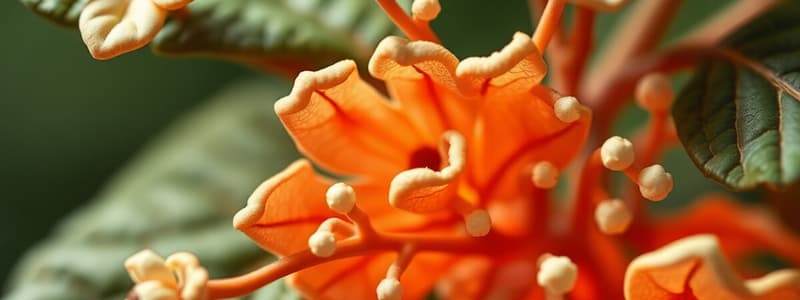Podcast
Questions and Answers
What is the primary function of collenchyma tissue in plants?
What is the primary function of collenchyma tissue in plants?
- Mechanical support (correct)
- Photosynthesis
- Water storage
- Nutrient transport
Which characteristic distinguishes angular collenchyma from other types?
Which characteristic distinguishes angular collenchyma from other types?
- Thickening distributed evenly throughout the cell
- Cells with uniformly thickened walls
- Contains large intercellular spaces
- Thickening occurring at the corners of cells (correct)
How does the presence of chloroplasts in collenchyma cells primarily benefit plants?
How does the presence of chloroplasts in collenchyma cells primarily benefit plants?
- Improves cell wall strength
- Enhances water absorption
- Enables flexibility
- Facilitates food storage (correct)
Which type of collenchyma contains continuous layers of thickening in its cell walls?
Which type of collenchyma contains continuous layers of thickening in its cell walls?
What structural feature of collenchyma allows for close packing of cells?
What structural feature of collenchyma allows for close packing of cells?
During the secondary growth of a plant, what happens to collenchyma tissues?
During the secondary growth of a plant, what happens to collenchyma tissues?
Which component predominantly contributes to the thickening of the cell walls in collenchyma?
Which component predominantly contributes to the thickening of the cell walls in collenchyma?
In which part of the plant is collenchyma tissue typically located?
In which part of the plant is collenchyma tissue typically located?
What structural aspect of collenchyma cells allows for flexibility in plants?
What structural aspect of collenchyma cells allows for flexibility in plants?
Which type of collenchyma is described as having thickening more around intercellular spaces?
Which type of collenchyma is described as having thickening more around intercellular spaces?
Flashcards
Collenchyma
Collenchyma
A simple, permanent plant tissue found in shoots and leaves, providing structural support.
Collenchyma cell walls
Collenchyma cell walls
Thickened with cellulose, providing strength to growing shoots and leaves.
Collenchyma location
Collenchyma location
Typically between the stem's cortex and vascular bundles' endodermis.
Collenchyma cell types
Collenchyma cell types
Signup and view all the flashcards
Lacunar Collenchyma
Lacunar Collenchyma
Signup and view all the flashcards
Angular Collenchyma
Angular Collenchyma
Signup and view all the flashcards
Annular Collenchyma
Annular Collenchyma
Signup and view all the flashcards
Lamellar Collenchyma
Lamellar Collenchyma
Signup and view all the flashcards
Collenchyma cell shape
Collenchyma cell shape
Signup and view all the flashcards
Collenchyma function
Collenchyma function
Signup and view all the flashcards
Study Notes
Collenchyma Tissues
- Collenchyma is a simple, permanent tissue found in shoots and leaves of plants.
- Collenchyma cell walls are thickened with cellulose.
- Thickening mainly occurs at the corners.
- This tissue provides strength, especially in growing shoots and leaves.
- Cells are tightly packed, with fewer intercellular spaces.
Characteristics of Collenchyma
- Typically located between the stem's cortex and vascular bundles' endodermis.
- Consists of living cells.
- Cell shapes are elongated, oval, spherical, or polygonal.
- Cells have unevenly thickened primary cell walls.
Additional Collenchyma Characteristics
- Intercellular spaces are small.
- Collenchyma can expand in radial and tangential directions due to weak lignified cell walls.
- Contains chloroplasts for food storage.
- Gets crushed during secondary plant growth.
Types of Collenchyma
- Based on cell wall thickening patterns:
- Angular collenchyma: Uniformly thickened corners. Most common type.
- Annular collenchyma: Uniformly thickened cell walls.
- Lamellar collenchyma: Unevenly thickened, with continuous layers.
- Lacunar collenchyma: Thickening concentrated around intercellular spaces.
Collenchyma Structure and Function
- Structure: Cells are typically spherical, oval or polygonal, with minimal intercellular spaces. Cell corners are thickened with cellulose and pectin. Most cell walls are thin.
- Function: Close packing for structural support. Thickened corners offer mechanical strength. Thin walls allow for flexibility.
Functions of Collenchyma
- Provides structural support, acting like an internal framework similar to bones.
- Protects the plant from damage caused by stresses (rain, wind).
- Supports growing areas (shoots, leaves).
- Fills vacant areas to be used for later growth.
Studying That Suits You
Use AI to generate personalized quizzes and flashcards to suit your learning preferences.



